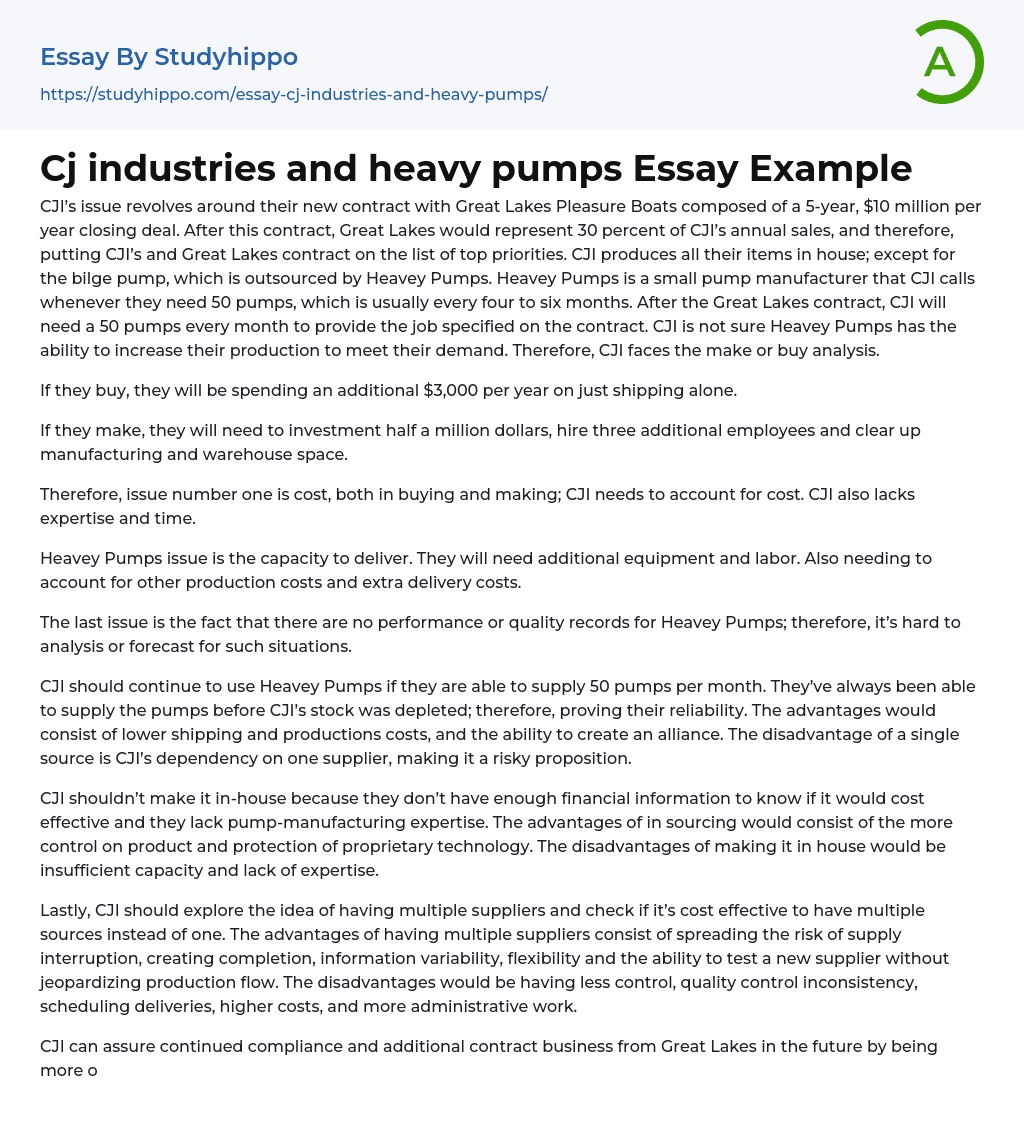CJI is primarily concerned about their recent contract with Great Lakes Pleasure Boats. The contract will last for 5 years and involve an annual closing deal worth $10 million. This agreement makes Great Lakes responsible for 30% of CJI's yearly sales, making it a top priority. While CJI manufactures all their products internally, they outsource the production of bilge pumps to Heavey Pumps. Normally, CJI contacts Heavey Pumps every four to six months for 50 pumps. However, due to the Great Lakes contract, CJI now needs 50 pumps on a monthly basis in order to fulfill their obligations. The uncertainty lies in whether Heavey Pumps can increase their production to meet this higher demand. As a result, CJI must make a decision regarding whether to continue outsourcing or switch to in-house production.
If they make a purchase, they will need to spend an extra $3,0
...00 annually solely on shipping costs.
If they decide to proceed, they will have to invest $500,000, employ three more workers, and free up manufacturing and warehouse capacity.
The main concern for CJI is the cost, which includes both purchasing and production. Furthermore, a lack of expertise and time poses challenges for CJI.
Heavey Pumps is mainly concerned with their delivery capability. To resolve this issue, they need to acquire more equipment and labor. Additionally, it is crucial to factor in other production expenses and extra costs related to delivery.
The lack of performance or quality records for Heavey Pumps makes it difficult to analyze or forecast such situations.
If CJI can continue receiving 50 pumps per month from Heavey Pumps, it is
advisable to maintain their usage. Heavey Pumps has consistently delivered the pumps before CJI runs out of stock, proving their reliability. This choice would lead to reduced shipping and production expenses for CJI and open up possibilities for a partnership. However, relying solely on one supplier poses a risk as it makes CJI dependent on a single source.
CJI should not bring pump manufacturing in-house due to a lack of financial information and expertise. The benefits of in-sourcing include better control over the product and protection of proprietary technology. However, the drawbacks of making it in-house are inadequate capacity and a lack of expertise.
In conclusion, CJI should consider the possibility of utilizing multiple suppliers to determine if it is economically beneficial compared to relying on a single source. The benefits of employing multiple suppliers include minimizing the risk of supply disruptions, fostering competition, obtaining diverse information, enhancing flexibility, and allowing for the assessment of new suppliers without disrupting production. However, there are also drawbacks such as reduced control, inconsistent quality control, managing delivery schedules, increased expenses, and additional administrative responsibilities.
To secure ongoing compliance and attract more contract business from Great Lakes in the future, CJI needs to improve organization and demonstrate reliability through careful oversight of costs, performance, and quality.
- Classical Mechanics essays
- Rail Transport essays
- Tata Motors essays
- Vehicle Brands essays
- trucks essays
- Auto Racing essays
- Harley-Davidson essays
- Suzuki essays
- Lexus essays
- Mercedes-Benz essays
- Auction essays
- Balanced Scorecard essays
- Business Plans essays
- Expense essays
- Income essays
- Net Income essays
- Security Guard essays
- Singapore Airlines essays
- Battle essays
- Intranet essays
- Maintenance essays
- Simulation essays
- Inn essays
- Chief Executive Officer essays
- Convenience Store essays
- Firm essays
- Training And Development essays
- Unilever essays
- Variable Cost essays
- Virgin Group essays
- Bargaining essays
- Entity essays
- Pest analysis essays
- Leadership and Management essays
- Change Management essays
- Project Management essays
- Knowledge Management essays
- Operations Management essays
- Quality Management essays
- Risk Management essays
- Scientific Management essays
- supply chain management essays
- Performance Management essays
- Time Management essays
- Brand Management essays
- Total Quality Management essays
- Risk essays
- Manager essays
- Leadership essays
- Business Ethics essays




